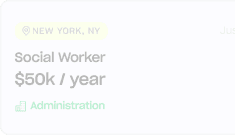

Thank you to our partner Capitalize for collaborating with us and allowing this resource to come to life.
Jobs aren’t quite the same as they were in the 90s. People don’t spend a decade or more at the same job anymore. They experience more layoffs and switch employers more often. With frequent job changes, it’s not a surprise that people leave their 401(k)s behind, often forgetting about them completely.
Forgotten 401(k)s actually grew to $1.65 trillion in assets during 2021 and 2022, according to Capitalize which is a free service that helps people claim and rollover their old retirement accounts.
?
Enter the job hopper. “Job hopping” is a buzzword created online to give name to a phenomenon of when employees spend less than a year at a job before quitting to move to the next one in hopes of negotiating a higher salary and increasing their benefits, flexibility, and experience. It’s also what helped our founder, Hannah Williams, increase her own salary and eventually start Salary Transparent Street. Job hoppers are some of the most affected by forgotten 401(k) accounts and savings.
When leaving a job after any amount of time, it’s your responsibility to decide what to do with your old 401(k). Unfortunately, these accounts don’t follow you from job-to-job and the longer you procrastinate dealing with them, the more you could lose out on those hard earned gains on investments, resulting in decreased retirement funds.
Let’s dig deeper into how you can roll over your 401(k) after leaving a job and how to recover lost or forgotten 401(k) accounts.
Key points:
- It’s most common to roll over your 401(k) to an IRA account after leaving a job.
- Leaving your 401(k) with your employer could cost a ton in fees and you could lose out on significant gains.
- 401(k) rollovers are surprisingly easy and completely free, including lost and forgotten accounts.
What is a 401(k) Rollover?
An employer-sponsored 401(k) is a common work benefit at many jobs that allows you to start contributing funds from your paycheck towards your retirement. Oftentimes the employer will match your contributions at a certain percentage, which is essentially free money invested into that account for you. Rolling over your 401(k) account after leaving a job is a process that makes sure you don’t lose this money.
401(k) rollovers consist of transferring funds from an employer-sponsored retirement savings account to an individual account or new employer’s 401(k) plan. This financial strategy allows individuals to consolidate their retirement savings, providing greater control, less fees, investment flexibility, and potential for growth. You may actually be able to retire up to 4 years sooner just by reducing your 401(k) fees alone.
?
Rollovers are especially important for individuals who change jobs frequently, as they enable a seamless transition of retirement funds without incurring taxes or penalties, while also preserving a tax-advantaged status.
401(k) Rollover Options and Rules
When considering a 401(k) rollover, there are several options and rules to keep in mind. If you’re rolling over a traditional 401(k) account, you have the option to transfer those funds into another qualified retirement account, such as an Individual Retirement Account (IRA), a Roth Individual Retirement Account (Roth IRA) for rolling over Roth 401(k) accounts, or a new employer's 401(k) plan.
Rollovers to a traditional IRA or a new employer's traditional 401(k) plan usually have no immediate tax consequences. The same goes for rolling over Roth 401(k) accounts into a Roth IRA. However, if you're moving funds from a traditional 401(k) to a Roth IRA or Roth 401(k), that is considered a Roth conversion and you'll need to pay income taxes on the converted amount.
Generally, you have 60 days from the time you receive a distribution from your old 401(k) to complete the rollover if you do an indirect rollover. If you fail to do so, the distribution might be subject to taxes and penalties.
?
The rules and options can vary, so it's essential to understand your specific circumstances and consult with professionals who can provide personalized advice based on your financial goals and needs. The professionals at Capitalize are a great place to start (and it’s completely free).
How to Roll Over Your 401(k)
To start your 401(k) rollover using Capitalize, select the “Get Started” button on the Capitalize website. From there you’ll be asked to provide a few details about your old retirement account and where you’d like to roll it over.
With Capitalize, you can successfully transfer your old retirement account into an IRA that you control, not your old employer. It’s usually most common to rollover your old 401(k) to an IRA instead of a new employer’s plan. IRAs generally come with more flexibility for investment options and less fees than employer-sponsored 401(k) plans.
?
If you don’t have any details about your old account, there is an option to select in which Capitalize will find your account for you. This is honestly my favorite Capitalize feature and has helped me find and rollover 3 lost 401(k)s of mine.
?
Once you locate your old 401(k), choose an IRA that best fits your needs for your rollover. This can be an existing IRA that you have, or a completely new one. If you don’t know where to begin with finding where to open an IRA at, Capitalize will also give you a few of their own suggestions based on what’s most important to you.
?
?
After all of the information is submitted, Capitalize takes it from there. Their team will begin processing your rollover, including all paperwork and communicating with your retirement account provider(s). They also don’t miss a beat in making sure the status is promptly communicated back to you, with up-to-date widgets for each rollover that are updated in real-time on the Capitalize dashboard.
?
Once the process is complete, Capitalize will notify you for any additional action needed on your part and you’re done!
?
How Job Hopping Might Actually Help You Save More for Retirement
Job hopping seems like a term that would reflect workers in a negative light. But that’s far from the truth.
In today’s context, the term could potentially open up hiring managers to negative bias towards candidates with less than 1 year at a job listed on their resume. Realistically, job hopping represents people standing up for what they deserve and taking action. Their employers would dump them in a second in the name of profits. So, why can’t we do what’s best for our own finances? One of the ways job hoppers do this is by taking advantage of 401(k) matching benefits at each job that helps them to save significantly more, especially when moving to a job that has a better match.
Then on top of that, they save more money on fees from making sure they rollover their old 401(k)s to an IRA using Capitalize, which could potentially help them retire even sooner!
If you want to learn more about 401(k) rollovers and how to get started with your own today, check out Capitalize and initiate your first rollover for free. With 1,000+ 5-star reviews on TrustPilot, you really can’t go wrong.
?
Alright, that wraps it up for this week! I’m Daniella Flores, a former software engineer turned career researcher who writes about tech, money, and different jobs. My work has been featured in TIME, CNBC, CNET, Business Insider, and Investopedia (among many others). I’m extremely passionate about workers' rights and financial freedom, so it’s a pleasure to be able to bring you this type of content through the Salary Transparent Street blog (thank you for the opportunity, Hannah!) If you want to connect, follow me on Linkedin. Chat soon!
Download our free Market Research Guide to learn what you should be making.
Need help negotiating? Our free Salary Negotiation Guide has scripts and tips to get you a higher salary at your current (or new) job.
Explore thousands of individually reported, contextual salaries across all industries in our Salary Database!
Follow us on TikTok, Instagram, Facebook, YouTube and LinkedIn for daily pay transparency interviews and career news you can use!
Subscribe to our weekly newsletter for news updates, professional deep dives, learning opportunities, and more!
Send us an email ➡️ hello@salarytransparentstreet.com


